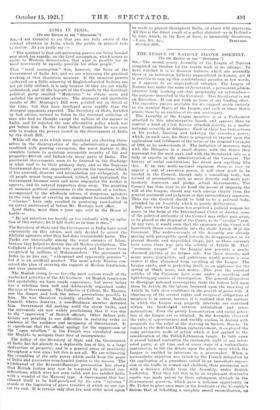INDIA IN PERIL.
[To THE EDITOR OF THE " SPECTATOR.") am thankful to see that you are fully aware of the critical situation in India which the public in general fails to realize. As you justly say :—
" The mischief is that self-governing powers are being handed over much too rapidly, on the fatal assumption, which comes so easily to Western democracies, that what is possible for us must necessarily be equally possible for other people."
That "fatal assumption" was, however, the basis of the Government of India Act, and we are witnessing the practical working of that disastrous measure. If the immense powers conferred on a little minority of English-educated Indians are not yet fully utilized, it is only because (1) they are not wholly understood, and (2) the boycott of the Councils by the dominant political party enabled " Moderates" to obtain scats and excluded the extreme elements. The necessary and inevitable results of Mr. Montagu's Bill were pointed out in detail at the time; but they have developed more rapidly than the strongest opponents expected. The Secretary of State, fortified by bad advice, refused to listen to the .reasoned criticism of men who had no thought except the welfare of the masses of India, and lie rejected the safe alternative policy which was put before him. In the Joint Select Committee he was even able to weaken the powers vested in the Government of India by the draft Bill.
While all the evils which were predicted are showing them- selves in the disintegration of the administrative machine, combined with growing corruption, the worst feature is the complete failure to maintain reasonable security of life and property—British and Indian—in many parts of India. The provincial Governments seem to be fettered in the discharge of what used to be their primary duty, and as the Supreme Government does not, apparently, perform the functions which it has annexed, disorder and intimidation are widespread. As all people resent being murdered, robbed, and terrorized, the Government becomes more and more unpopular the weaker it appears, and its natural supporters drop away. The granting of immense political concessions to the demands of a faction, accompanied by the wholesale release of dangerous agitators in the vain hope of creating an atmosphere favourable to the reforms," have only resulted in producing race-hatred to an extent undreamed of before Mr. Montagu took office.
Lord Sinha, more than a year ago, said in the House of Lords:—
"Do not interfere too hastily or too violently with an agita- tion of this nature; let it kill itself, as in time it does."
The Secretary of State and the Government of India have acted consistently on this advice, and only decided to arrest the Khilafat agitators after they had done irremediable harm. The Turks are historically among the worst enemies of Islam, because they helped to destroy the old Moslem civilization. The Caliphate at Constantinople was usurped, and has never been recognized by millions of Mohammedans. The movement in India is, as you say, " widespread and apparently genuine"; but it is an artificial product. The more astute Hindus con- ceived the plan of securing the support of Moslem fanaticism, and were successful.
The Moplah rising is—so far—the most serious result of the unchecked activities of the Ali brothers. Of Moplah fanaticism and excitability we have ample experience; but never before has a rebellion been well and deliberately organized under the eyes of Government. The Collector of Calicut, Mr. Thomas, saw the danger and took the minor precautions possible to him. He was therefore violently attacked in the Madras Council, where, however, a non-Brahman member defended him. Government did nothing until the storm broke, and the extremists are now widely proclaiming that it was due to the " oppression " of British officials. Other Indian poli- ticians are pointing to our difficulties in restoring order as evidence of the weakness and incapacity of Government. It is significant that the official apology for the suppression of the "open rebellion" in the Punjab was circulated among the Moplahs to mitigate their fear of consequences.
The policy of the Secretary of State and the Government of India has led already to a deplorable loss of life, to a large destruction of property, and to a general sense of insecurity throughout a vast area; but this is not all. We are witnessing the crumbling of the only power which could keep the peace of India and guarantee even-handed justice to the masses. The withdrawal of the Kernani-Banerjee prosecution has shown that British justice may now be tempered by political con- siderations, which were not even valid, and has saddled India with a scandal of the Marconi type. A Government that has allowed itself to be half-paralysed by its own " reforms " stands at the beginning of grave troubles of which no one can see the end. It is certain only that law and order must again be made to prevail throughout India, or chaos will supervene, All this is the direct result of a policy dictated—as in Ireland-. by fear, which, in the East at least, is inexorably disastrous.


































 Previous page
Previous page